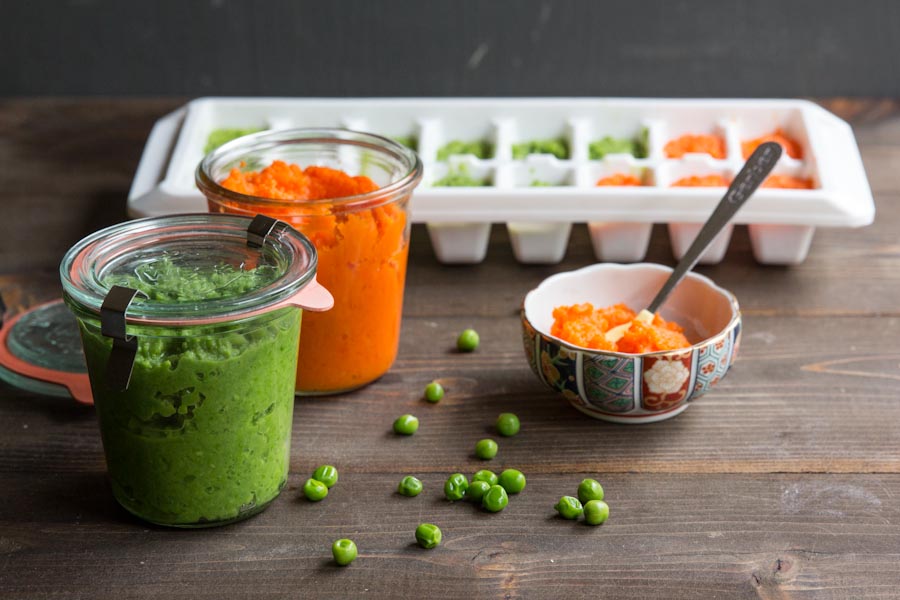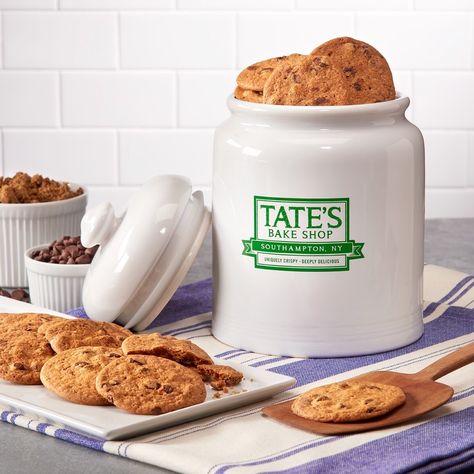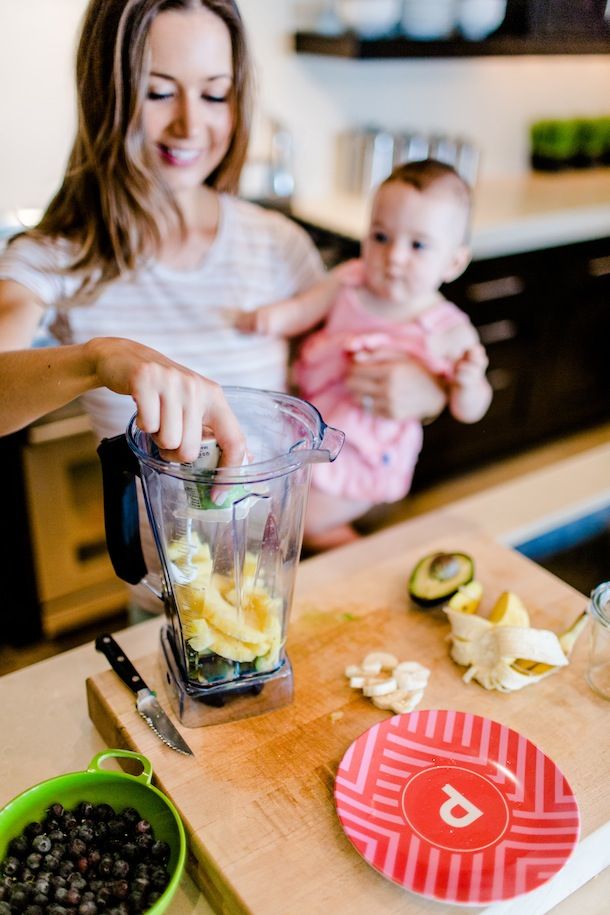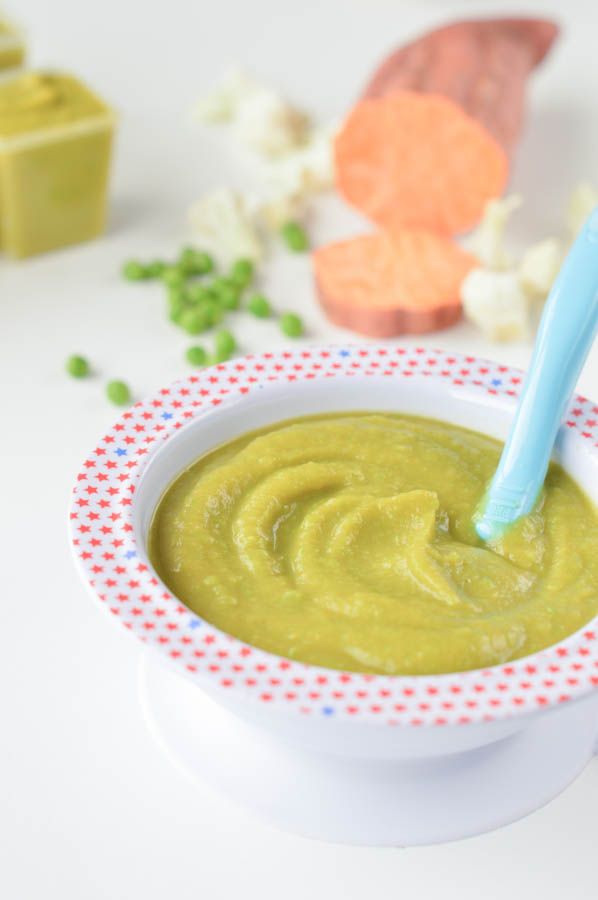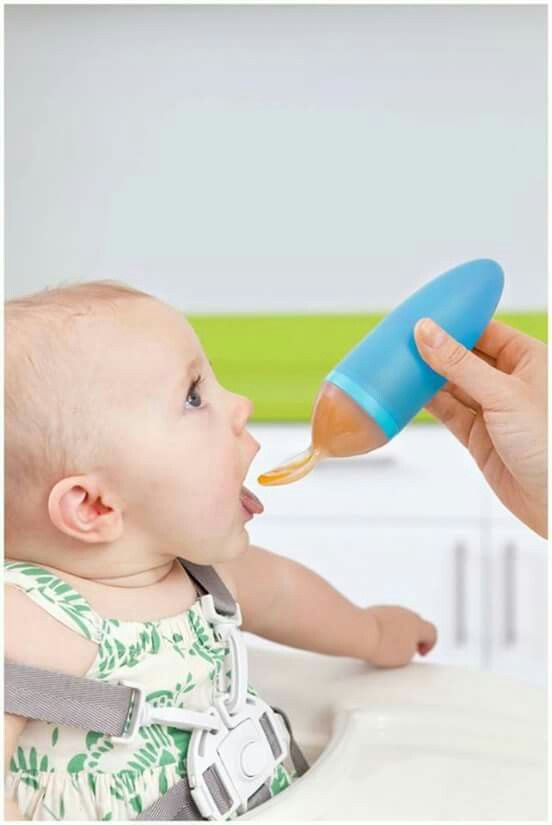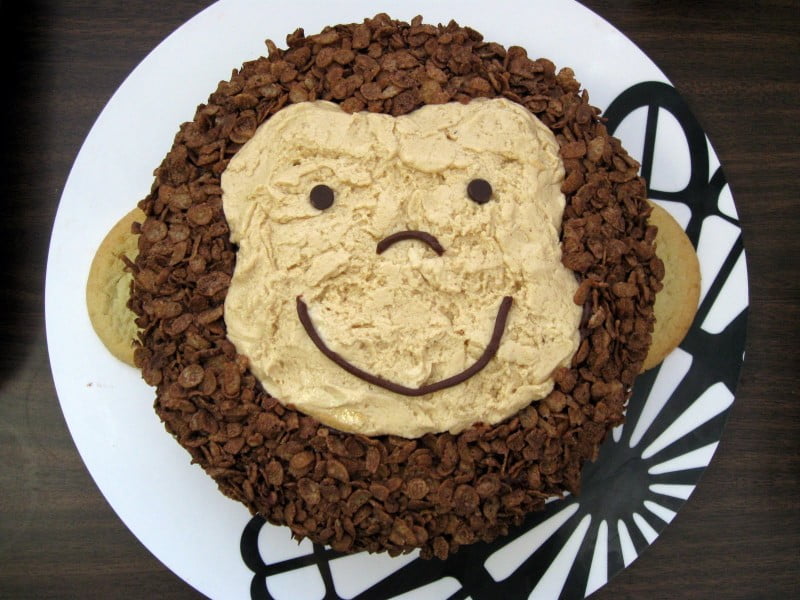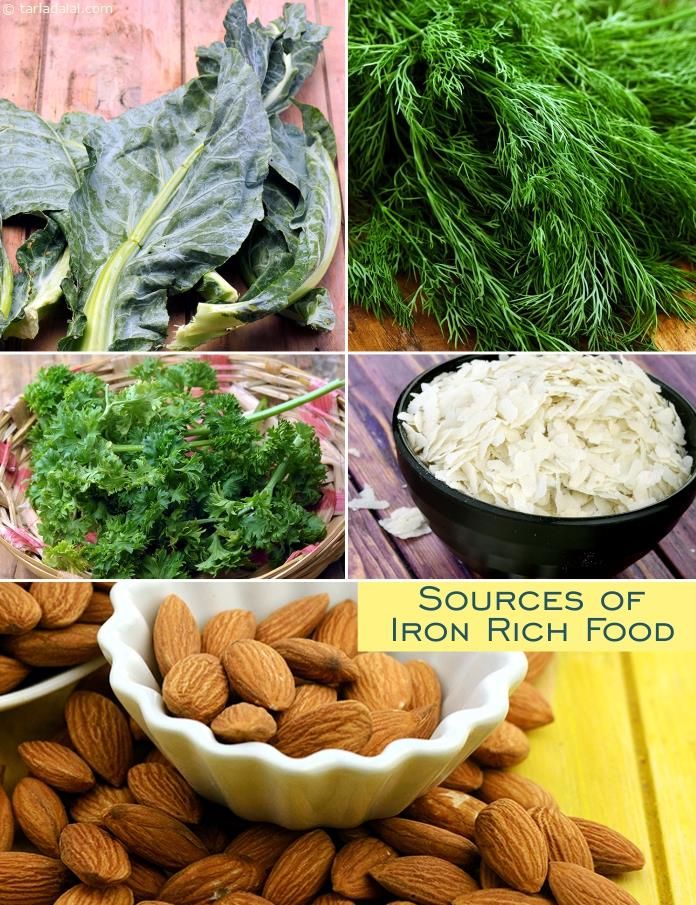Fast and fresh baby food
Fast & Fresh Baby Food Cookbook: 120 Ridiculously Simple and Naturally Wholesome Baby Food Recipes by Jacqueline Burt Cote, Paperback
Introduction 8
Chapter 1 Only the Freshest Ingredients
Opting for Organic 12
Fresh, Frozen, or Canned? 13
Superfoods 14
Buying Locally Grown 16
Allergy Awareness 16
Cleanliness and Safety 18
A Word on Dessert 18
Chapter 2 Fast and Easy Cooking
Cooking Methods for All 22
Tools and Equipment 22
Storing, Thawing, and Reheating 23
Planning and Prepping Ahead 24
How to Use This Book 25
Chapter 3 Smooth Introductions
Single-Ingredient Purées
Cooked Fruit Purées 30
Raw Fruit Purées 32
Steamed Vegetable Purées 33
Cereals 35
Fruit and Vegetable Combination Purées
Green Beans and Pear Purée 36
Apple and Mango Purée 37
Avocado and Banana Purée 38
Peas and Carrots Purée 39
Plum and Nectarine Purée 40
Carrot and Mango Purée 41
Sweet Potato and Green Beans Purée 42
Avocado and Pear Purée 43
Zucchini and Banana Purée 44
Apple, Nectarine, and Banana Purée 45
Chapter 4 New Flavors and Textures
Single-Ingredient Purées
Cooked Fruit Purées 50
Raw Fruit Purées 51
Steamed Vegetable Purées 52
Sautéed Greens Purées 53
Cereal Combinations
Quinoa and Banana Purée 54
Apple Pie Oatmeal Purée 55
Avocado, Sweet Potato, and Brown Rice Purée 56
Blueberries and Quinoa Purée 57
Papaya, Kiwi, and Oatmeal Purée 58
Fruit and Vegetable Combination Purées
Blueberry-Apple Yogurt Purée 59
Kale and Avocado Purée 60
Peas, Pear, and Broccoli Purée 61
Cauliflower and Sweet Potato Purée 62
Kiwi, Asparagus, and Banana Purée 63
Peach, Blueberries, and Carrot Purée 64
Papaya, Banana, and Cantaloupe Yogurt 65
Broccoli, Cauliflower, and Carrot Purée 66
Green Beans and Papaya Purée 67
Butternut Squash, Cauliflower, and Peas Purée 68
Kiwi and Zucchini Purée 69
Peach, Kale, and Tofu Purée 70
Watermelon and Pear Purée 71
Asparagus, Honeydew, and Peas Purée 72
Apricot, Cherries, and Banana Purée 73
Meat Combination Purées
Chicken, Pears, and Quinoa Puree 74
Chicken and Avocado Puree 75
Chicken, Apricots, and Prunes Purée 76
Chicken and Zucchini Purée 77
Turkey, Mango, and Cucumber Purée 78
Turkey and Plums Purée 79
Turkey, Carrots, and Broccoli Purée 80
Pork and Apples Purée 81
Pork, Carrots, and Brown Rice Purée 82
Beef, Sweet Potatoes, and Swiss Chard Purée 83
Beef and Parsnips Purée 84
Beef and Green Beans Purée 85
Chapter 5 Balanced Bites and Finger Foods
Combination Purées
Peach, Plum, and Strawberry Oatmeal Purée 90
Chickpea, Sweet Potato, and Cauliflower Purée 91
Black Beans, Collard Greens, and Parsnip Purée 92
Chicken, Apple, and Sweet Potato Purée 93
Chicken, Peas, and Banana Purée 94
Chicken, Peach, and Pumpkin Purée 95
Turkey, Kale, and Papaya Purée 96
Turkey, Cauliflower, and Apricot Purée 97
Turkey, Peas, and Apple Purée 99
Pork, Cherries, and Pears Purée 101
Beef and Carrot Purée 102
Beef, Asparagus, and Pear Purée 103
Beef, Zucchini, and Cherries Purée 104
Beef, Green Beans, and Prunes Purée 105
Finger Foods
Avocado Toast 106
Applesauce Muffins 107
Roasted Sweet Potato Nibbles 108
Tofu Bites 109
Fun-Size Asparagus Frittatas 110
Turkey and Cheese Quesadillas 111
Broccoli and Carrot Pancakes 112
Sweet Potato and Bean Balls 113
Baked Pear Slices 114
Apple Date Bars 115
Baby Meals
Cottage Cheese and Kiwi 116
Strawberry-Papaya Yogurt Mix-Ins 117
Confetti Couscous 118
Tasty Turkey, Sweet Potato, and Bean Stew 119
Butternut Squash "Mac and Cheese" 121
Tofu, Quinoa, and Avocado Bowl 122
Mini Apple-Turkey Meatballs 123
Leftover Chicken and Brown Rice with Sauteed Kale 124
Easy Black Bean and Zucchini Soup 125
Mini Meat Loaf Muffins 126
Alphabet and Veggie Pasta 127
Chapter 6 Real Meals and Snacks
Real Meals
Whole-Wheat Banana Pancakes 132
Breakfast Couscous 133
Tofu Scramble 134
Quick Red Lentil Soup 135
Simple Butternut Squash Soup 136
Mac and Cheese Soup 137
Mozzarella Poppers 138
Quinoa-Veggie Fritters 139
Creamy Polenta with Tomato Sauce 141
Mexican "Pizza" 142
Mini Spinach Pizzas 143
Spinach Pesto Pasta 144
Speedy Pasta Primavera 145
Gnocchi Bolognese 146
Baked Mini Rice Balls 147
Chicken Fried Rice 148
Ham and Cheese Pockets 149
Fish Fingers 151
Taco "Salad" 152
Beef and Broccoli 153
Snacks
Good Greens Smoothie 154
Strawberry-Banana Surprise Smoothie 155
Almond Butter Cereal Balls 156
Sunflower Seed Butter and Banana Pinwheels 157
Zucchini Mini Muffins 158
Edamame Hummus 159
White Bean Dip 160
Cheese Fondue Dip 161
Hummus and Carrot Pinwheels 162
Cheesy Carrot Balls 163
Appendix A Recipes for the One-Year Birthday Party 164
Appendix B Sample Meal Plans 173
Appendix C Measurement Conversions 177
References 178
Index 181
10 Easy Homemade Baby Food Ideas (No-Cook, Super Fast, Stage 1)
Learn how to make the EASIEST homemade baby food recipes (stage 1) for your little one with these super simple no-cook ideas. Plus: I have the best tips for making them ahead and freezing them so you can batch cook and simplify your days!
Homemade Baby Food
As a mom to three kids, I know firsthand how the urge to make homemade baby food can be both exciting and a little daunting. And if you have a busy schedule or other kids in the house, finding the time to actually do it can seem impossible. But, there are so many healthy foods that you can transform into stage 1 baby food purees with hardly any work or special equipment at all!
TIP: I use a regular blender for all of these recipes, so you don’t need to buy a special baby food maker unless you want to.
Baby Food Recipes for 6, 7, and 8 Month Old Babies
These homemade baby food ideas are designed for younger babies who are still eating thinner purees, but you can of course use them for older babies and toddlers too. Each can be served as is, or you can combine more than one together to create new flavors if you’re feeling creative!
TIP: If you want to add fat or protein to any of these fruit or veggie purees, simply stir in a little whole milk yogurt, coconut cream, or Avocado Puree.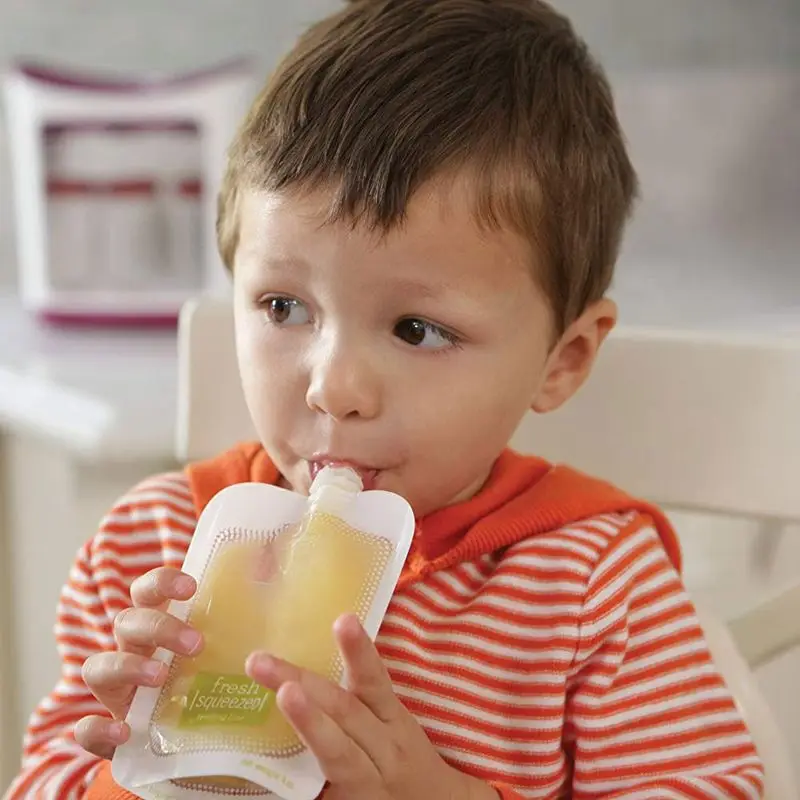
Best Way to Make Baby Food
I’ve found that the easiest and most approachable way to make baby food is to simply use a blender. With fresh ingredients and a little water, breastmilk, or formula to thin it as needed, you can easily make your baby meals without investing in equipment you may not use very long.
TIP: You’ll want to start with at least 1 cup of any base ingredient to ensure that there’s enough in the blender to fully blend up.
Tools You Need to Make Homemade Baby Food
To make these baby food recipes you’ll need:
- Blender (you could also use an immersion blender if yours is very strong)
- Water, formula, or breastmilk to thin as needed
- Knife for chopping produce
- Spoon
- Bowls
- Ice cube tray
- Freezer bags for storage
- Baby food storage containers
Stage 1 Baby Food
These baby foods are meant for early eaters as they are typically very thin and easy for a baby to move around in their mouths.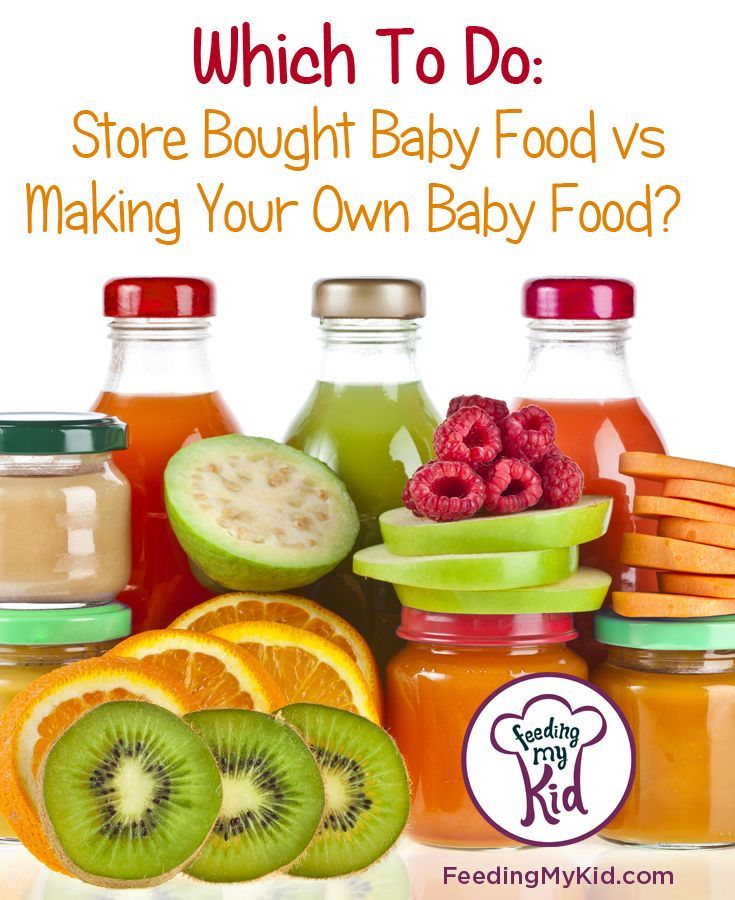 I follow the recommendations to wait until 6 months to start solids, so I personally don’t worry excessively about this distinction as I like babies to experience some texture in their purees. (The ones you find at the store are low allergenic foods and are meant for 4+ months.)
I follow the recommendations to wait until 6 months to start solids, so I personally don’t worry excessively about this distinction as I like babies to experience some texture in their purees. (The ones you find at the store are low allergenic foods and are meant for 4+ months.)
Stage 2 Baby Food
These baby foods are typically a little bit thicker, sometimes include more than one ingredient, and offer a wider variety of ingredients. Most babies are ready for these sorts of purees around 7-8 months, or once they’ve mastered thinner purees. (Again, since I like to do a combined baby feeding approach with both baby led weaning and purees, I don’t worry too much about following the calendar to decide when to introduce these.)
TIP: As a backup to my homemade baby foods, I love the options from Amara Organic Baby Food (paid affiliate link) since you simply need to stir it together with breast milk, formula, or water and it’s ready to serve.
And now, for my ten go-to homemade baby food purees that you don’t even need to cook!
1.
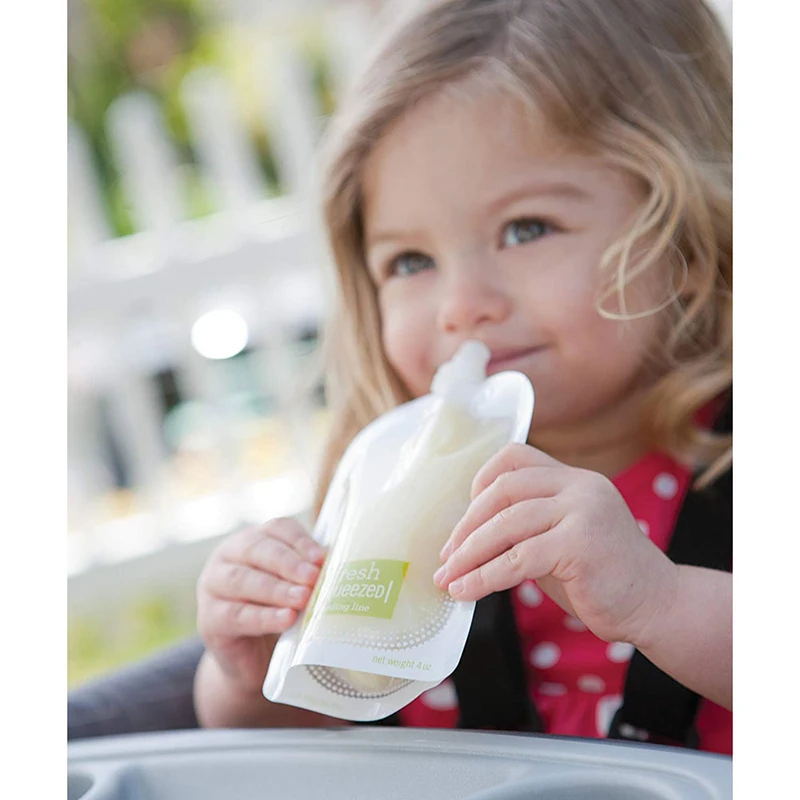 Avocado Puree
Avocado PureeTo make avocado puree for a baby, you just need a fresh avocado, a blender, and some lemon juice if you plan to store it for later. I sometimes even do this with just a fork if the avocado is super soft! It’s a perfect way to introduce a low allergenic food that’s rich in healthy fats.
TIP: Get the full recipe for Avocado Puree here.
2. Bean Puree
Baby’s early foods don’t have to be all one food group and beans are a great food to have in the mix. You can do this easy bean puree with chickpeas, pinto beans, black beans, or even white beans, thinning it as needed with water, formula, or breastmilk. This is a great puree to mix with a little sweet potato or butternut squash.
TIP: Get the full recipe for Bean Puree here.
3. Blueberry Puree
Using fresh or frozen blueberries, this easy berry puree is loaded with fresh flavor and antioxidants. It’s delicious on its own or stirred into plain whole milk yogurt or baby oatmeal. (Note that it thickens up as it sits in the fridge, so you’ll need to stir it well to serve.)
(Note that it thickens up as it sits in the fridge, so you’ll need to stir it well to serve.)
TIP: Get the full recipe for Blueberry Puree here.
4. Kiwi Puree
With a bright flavor, this puree is great for babies who seem to love flavor—and it’s a fun one to make and store for later. You’ll want to make sure that you choose very ripe and sweet kiwi and taste it before you make the puree to ensure that it’s not too tart. (If it seems tart, you can mix with banana or applesauce.)
TIP: Get the full recipe for Kiwi Puree here.
5. Mango Puree
Using fresh or thawed frozen mango, this baby puree blends up in seconds. It’s bright, flavorful, and a great source of immune-boosting vitamins. Taste your mango to be sure that it’s sweet and not too tart. (If it’s tart, you can add Applesauce or ripe Banana Puree.)
TIP: Get the full recipe for Mango Puree here.
6. Peach Puree
Turn fresh or frozen and thawed peach slices into a super smooth Stage 1 baby food with this easy blender method.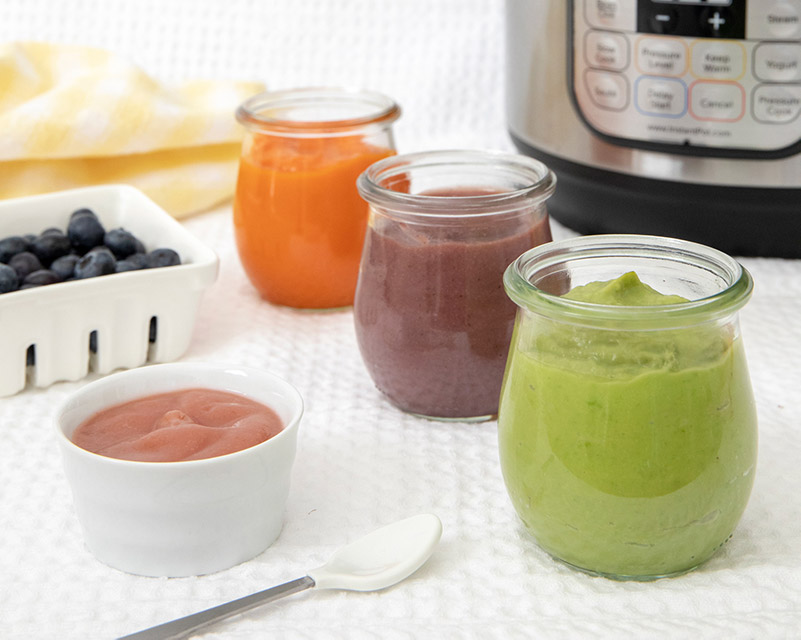 You’ll want to strain out the skin since it’s hard to blend up smooth, even with a high powered blender, but that’s so easy to do! This baby food recipe is a nice alternative to applesauce.
You’ll want to strain out the skin since it’s hard to blend up smooth, even with a high powered blender, but that’s so easy to do! This baby food recipe is a nice alternative to applesauce.
TIP: Get the full recipe for Peach Puree here.
7. Whipped Peanut Butter
This may not have occurred to you, but whipped peanut butter is a great baby food! This is a perfect way to introduce baby to peanut butter and to offer it safely there after. You just need to stir water into unsweetened creamy peanut butter until it forms a whipped consistency like yogurt. It’s smooth, not too sticky, and packed with protein.
TIP: Get the full scoop on introducing peanuts to baby here.
8. Pineapple Puree
Blend up fresh or frozen pineapple chunks into a tropical baby food puree that’s smooth and creamy. This is yummy on its own or paired with whole milk plain yogurt. Taste your pineapple to ensure that it’s not too tart. (If it’s tart, you can add Applesauce or ripe Banana Puree.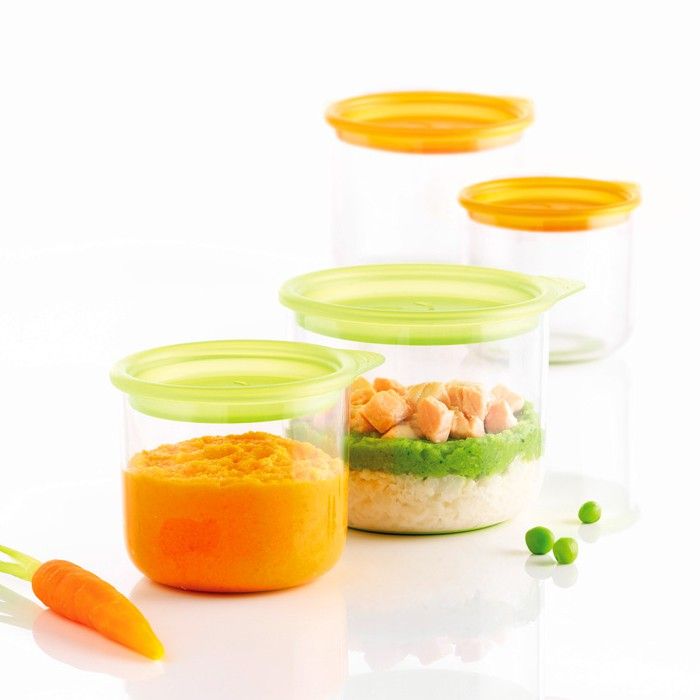 )
)
TIP: Get the full recipe for Pineapple Puree here.
9. Strawberry Puree
Fresh strawberries blend up into a perfectly smooth homemade puree without the need for any additional liquid. You can serve this as is, or mix with applesauce if desired. The flavor of your berries will determine the flavor of your puree, so be sure to taste them for sweetness.
TIP: Get the full recipe for Strawberry Puree here.
10. Banana Puree
Ripe bananas make great homemade baby food with the help of just a blender. This is a super simple baby food to make at home and it’s easy to digest as a Stage 1 baby food. Use ripe bananas with brown spots to ensure that the puree tastes sweet and is easy for baby to digest.
TIP: Get the full recipe for Banana Puree here.
Homemade Baby Food Storage
The easiest way to store homemade baby food is to add fresh purees to an ice cube tray and freeze.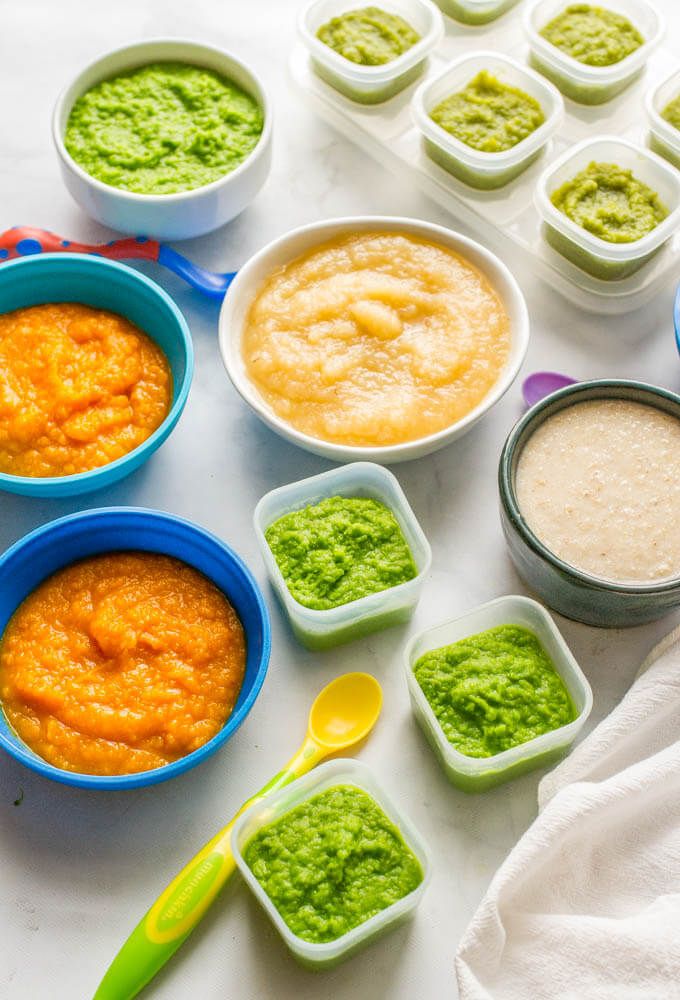 Once frozen, simply pop out the cubes and store in labeled freezer bags for up to 3 months. These are a perfect way to make it easy to send homemade baby food to daycare or to simply get ahead for the coming week.
Once frozen, simply pop out the cubes and store in labeled freezer bags for up to 3 months. These are a perfect way to make it easy to send homemade baby food to daycare or to simply get ahead for the coming week.
TIP: Find more information about storing baby food—including the best small food storage containers—here.
]
Tips for Making the Best Homemade Baby Food
- Use at least 1 cup base ingredient to ensure that a blender has enough volume to blend well.
- Thin any homemade puree with water, formula, or breast milk.
- Freeze any baby food you won’t use within 3 days in an ice cube tray. Transfer frozen cubes into freezer storage bags for up to 3 months. Thaw these frozen baby food recipes in an airtight container in the fridge overnight before you plan to serve.
- Taste all fresh foods for sweetness and to ensure that your puree isn’t too tart. To tame tartness, mix any puree with Banana Puree , Avocado Puree, Applesauce, or Mashed Sweet Potato.
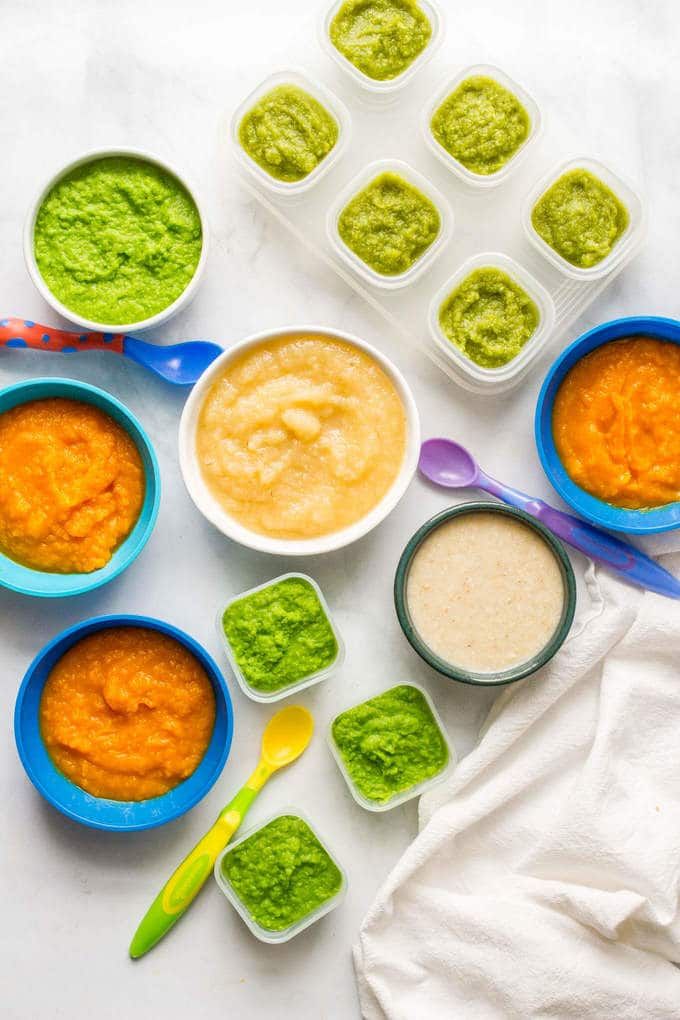
- If you want to add fat or protein to any of these fruit or veggie purees, simply stir in a little whole milk yogurt, coconut cream, or Avocado Puree.
- Use breastmilk or formula in place of the water if desired.
- Mix two purees together for more complex flavors.
- Add texture to any puree by stirring in baby oatmeal or hemp seeds.
- For more details on each of these, find them here: Avocado Puree; Banana Puree, Bean Puree; Blueberry Puree, Kiwi Puree, Mango Puree, Pineapple Puree, Peanut Butter Puree, Peach Puree, Strawberry Puree
I’d love to hear your feedback on this way of making simple baby food, so please comment below. I so appreciate hearing your experience with my recipes!
Prep Time 5 minutes
Cook Time 0 minutes
Total Time 5 minutes
Author Amy Palanjian
Cuisine American
Course Baby Food
Calories 42kcal
Servings 4
- ▢ 1 cup blueberries, diced strawberries, diced peaches (peeled), diced kiwi (peeled), diced pineapple (peeled), diced banana (peeled), diced mango (peeled), diced avocado (peeled), OR beans (rinsed and drained)
- ▢ water, formula, or breast milk (as needed)
Choose one fruit, the avocado, or beans and add to a blender.
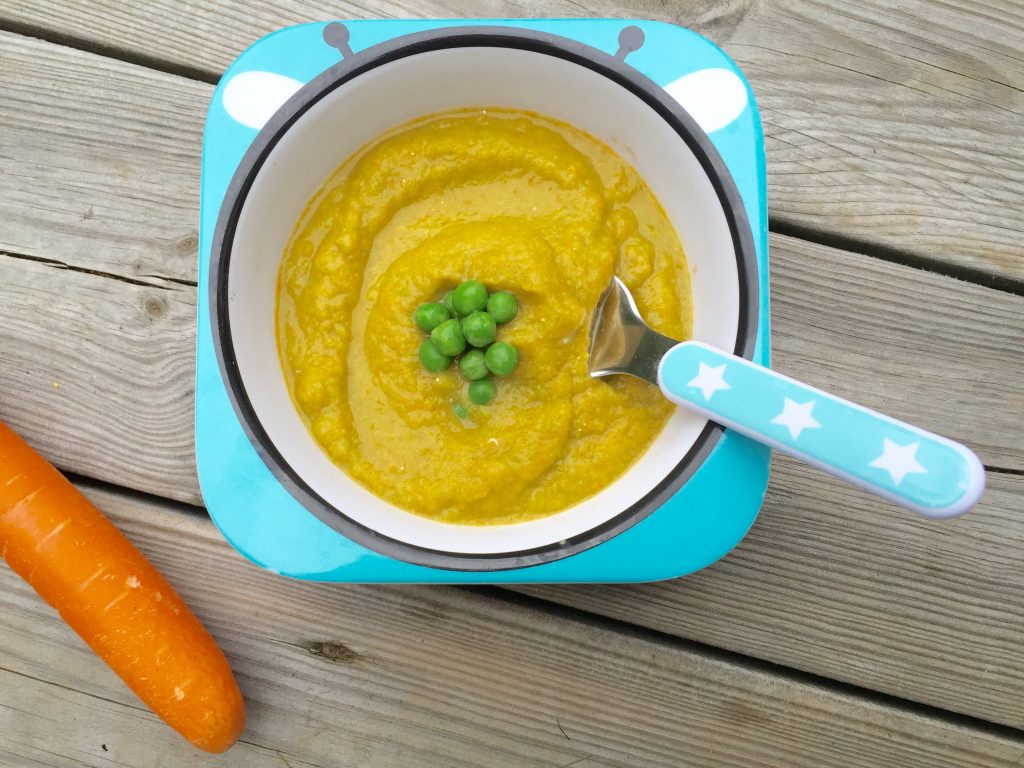
If making the puree with blueberries, strawberries, peaches, kiwi, pineapple, mango, or beans, add ¼ cup water and blend, adding more water as desired to make a thin, very smooth puree. If making avocado or banana, just blend (without water) until very smooth.
Serve or store in an airtight container for 3-5 days in the fridge, or up to 3 months in the freezer.
Vitamix Blender
Storage Containers
Silicone Ice Cube Tray
- Use at least 1 cup base ingredient to ensure that a blender has enough volume to blend well.
- Thin any homemade puree with water, formula, or breast milk.
- Freeze any baby food you won't use within 3 days in an ice cube tray. Transfer frozen cubes into freezer storage bags for up to 3 months. Thaw these frozen baby food recipes in an airtight container in the fridge overnight before you plan to serve.
- Taste all fresh foods for sweetness and to ensure that your puree isn't too tart.
 To tame tartness, mix any puree with Banana Puree , Avocado Puree, Applesauce, or Mashed Sweet Potato.
To tame tartness, mix any puree with Banana Puree , Avocado Puree, Applesauce, or Mashed Sweet Potato. - If you want to add fat or protein to any of these fruit or veggie purees, simply stir in a little whole milk yogurt, coconut cream, or Avocado Puree.
- Use breastmilk or formula in place of the water if desired.
- Mix two purees together for more complex flavors.
- Add texture to any puree by stirring in baby oatmeal or hemp seeds.
- For more details on each of these, find them here: Avocado Puree; Banana Puree, Bean Puree; Blueberry Puree, Kiwi Puree, Mango Puree, Pineapple Puree, Peanut Butter Puree, Peach Puree, Strawberry Puree
Serving: 0.25cup, Calories: 42kcal, Carbohydrates: 11g, Protein: 1g, Fat: 1g, Saturated Fat: 1g, Polyunsaturated Fat: 1g, Monounsaturated Fat: 1g, Sodium: 1mg, Potassium: 57mg, Fiber: 2g, Sugar: 7g, Vitamin A: 40IU, Vitamin C: 7mg, Calcium: 4mg, Iron: 1mg
Tried this recipe?Rate in the comments and tag @yummytoddlerfood on IG!
Baby food - Roskontrol
Useful articles
News (Gerber, Nan Optipro, Nestogen) - by 20-30%, cocoa and Nesquik drinks - by 20-25%.
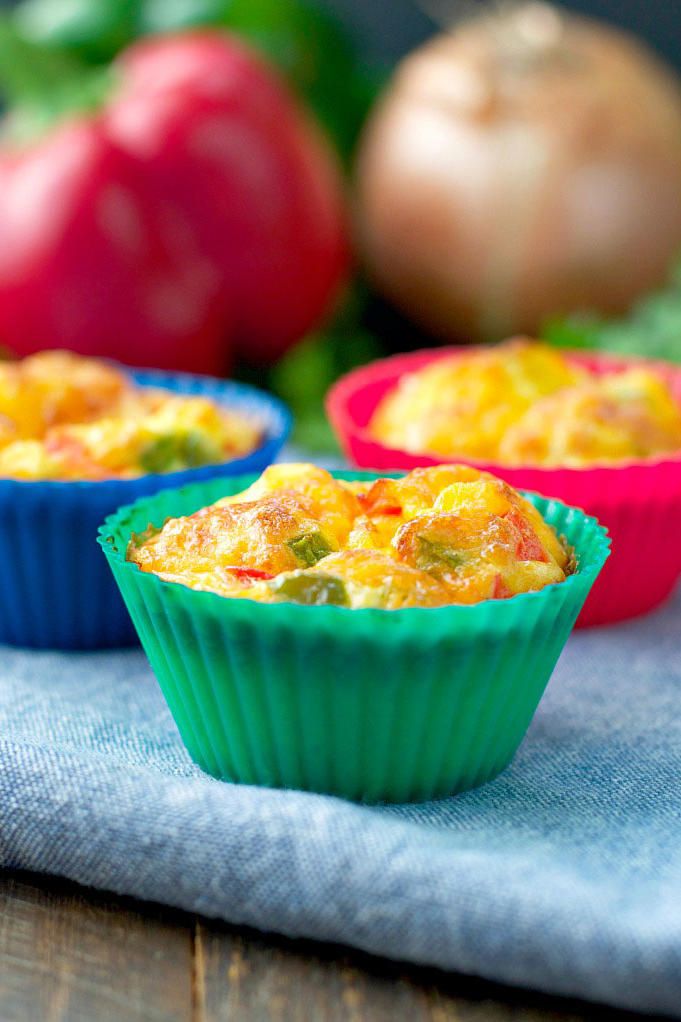 Also, ready-made breakfasts (Cini Minis, Fitness, Kosmostars) will increase in price by 20-30%, and Starbucks and Dolce Gusto brands by 30%. Unilever is also...
Also, ready-made breakfasts (Cini Minis, Fitness, Kosmostars) will increase in price by 20-30%, and Starbucks and Dolce Gusto brands by 30%. Unilever is also... March 22, 2022
Detsky Mir freezes prices for three months
The largest Russian retailer of children's goods fixed prices for 90 items for three months, including baby food, baby hygiene products, feeding supplies, clothing and footwear, at the level of January 2022 . Previously, the FAS, on the basis of requests received from citizens, sent a request to the Detsky Mir group of companies to provide data on the reasonableness of price increases. And also warned that...
February 16, 2022
Business predicts baby puree prices to rise due to labeling experiments
Manufacturers estimate that the introduction of a control system in the industry threatens a shortage and price increases of at least 10%. The business has therefore proposed to exclude baby puree made from meats, vegetables and fruits from the labeling experiment, which could begin as early as May 2022.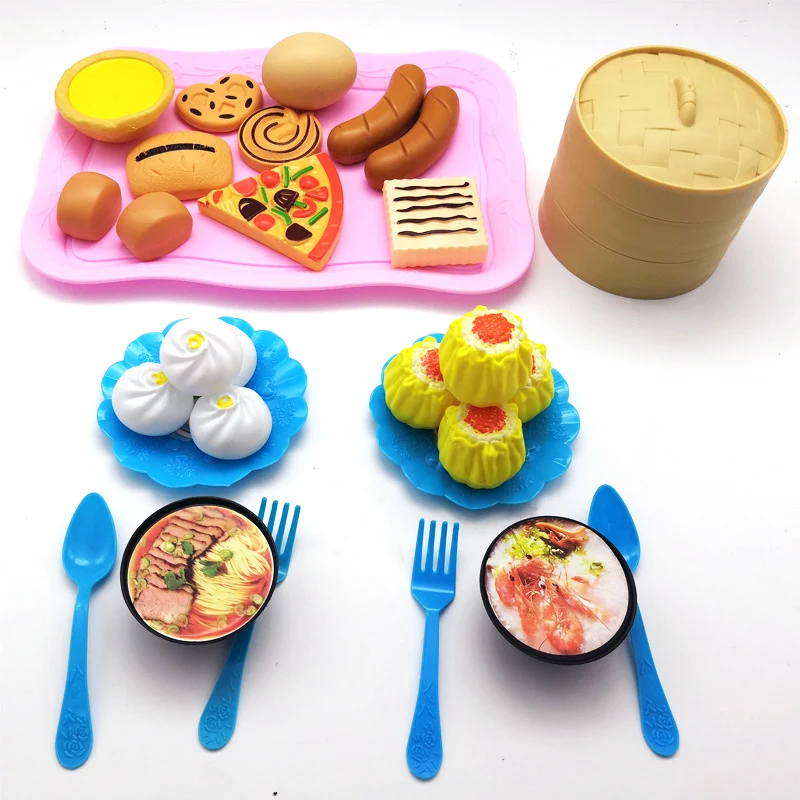 From the letter that the Association of Manufacturers "Rusbrand" sent to the Ministry of Economic Development, it follows that for foreign products it was ...
From the letter that the Association of Manufacturers "Rusbrand" sent to the Ministry of Economic Development, it follows that for foreign products it was ...
January 26, 2022
Baby cereals will become 15.5% more expensive from February
The largest manufacturer of baby food, known under the brand name FrutoNyanya (JSC Progress), told retail chains that it had to raise prices from February 1 by an average of 15.5%. The reasons for this are more than known - rising prices for raw materials, logistics, packaging components, and, in principle, unfavorable weather conditions for crop production. Company representatives so...
Goods with a quality mark
Black list
The ideal baby food up to 6 months is breast milk, but if it is not possible to feed the baby with mother's milk, then mixtures that are sold in stores come to the rescue. When choosing a ready-made mixture, follow the rule: the closer the mixture is to breast milk in composition, the better.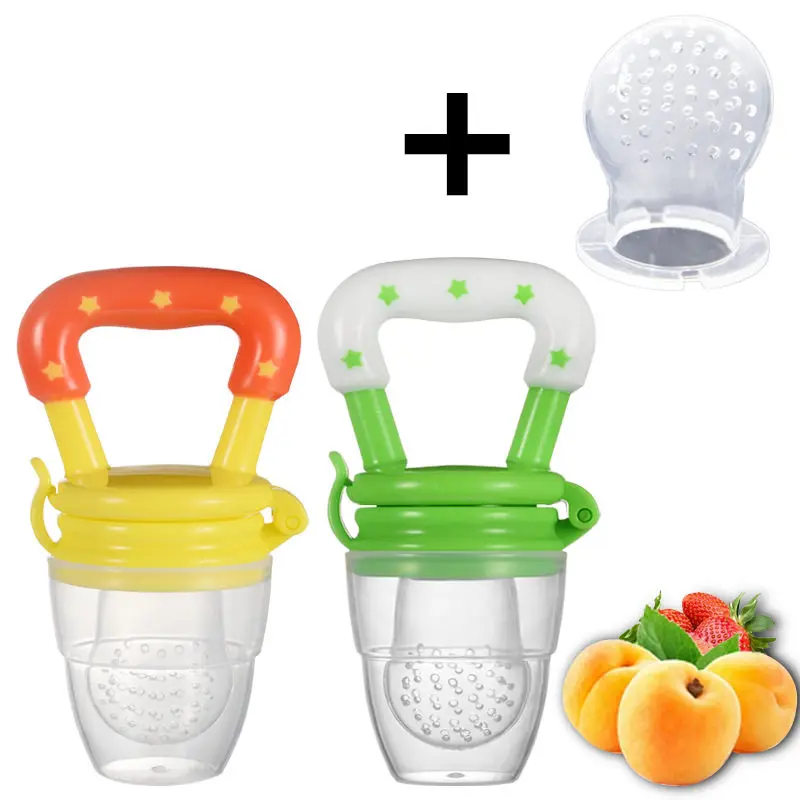
All formulas are thoroughly tested before entering the store, so they are all safe, which cannot be said about homemade food. But their price may differ, depending on how high-quality and modern the mixture is.
More modern formulas usually contain ingredients that have only recently been scientifically proven to be useful (eg, lutein). But this does not mean that traditional mixtures that do not contain this substance should be abandoned.
From 6-7 months, the baby begins to receive complementary foods, and by 8-9 months the proportion of mixtures in the child's diet is reduced to 50%, and the rest falls on fruit and vegetable puree, dairy-free cereals from ground cereals that do not contain gluten. At the second stage of complementary foods, meat puree can be introduced into the diet. It is not recommended to give juices to children under 1.5 years old.
Children under 1 year of age should not drink tea. It is better to boil baby water before drinking.
Starting from the age of 1, the baby can eat cottage cheese and other unsweetened fermented milk products.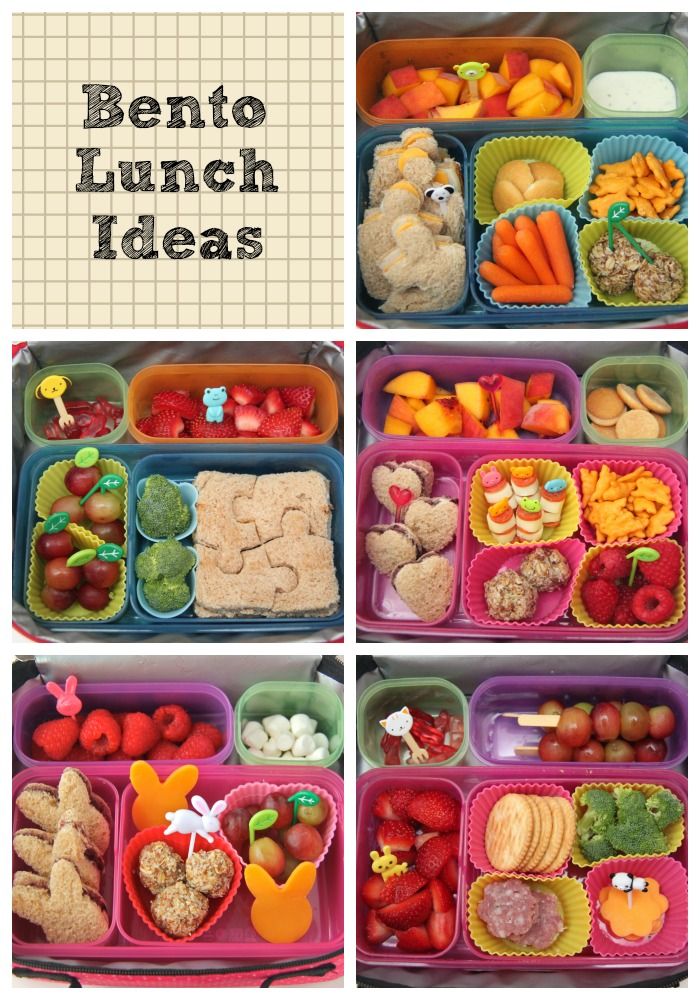 You need to be careful with yogurt: it may contain sugar, which is not recommended for children at this age. Kefir should be excluded from the diet of preschoolers, as it is highly acidic and may contain alcohol. Powdered milk for a baby can only be used as part of baking or in case of emergency.
You need to be careful with yogurt: it may contain sugar, which is not recommended for children at this age. Kefir should be excluded from the diet of preschoolers, as it is highly acidic and may contain alcohol. Powdered milk for a baby can only be used as part of baking or in case of emergency.
Sugar and salt are generally recommended to be excluded from the baby's menu until at least 3 years old. Caution should be given to the child honey - it can cause allergies.
Do not allow children to eat foods intended for adults. Sausages and sausages are not baby food. They may contain phosphates, preservatives, and too much salt and sugar, which is harmful to the baby.
Name of applicant organization
Name of contact person
Position
Phone
E-mail
Name of the declared product (goods)
I have read and accept the Rules for the Functioning of the Independent Quality Control System "Roskontrol".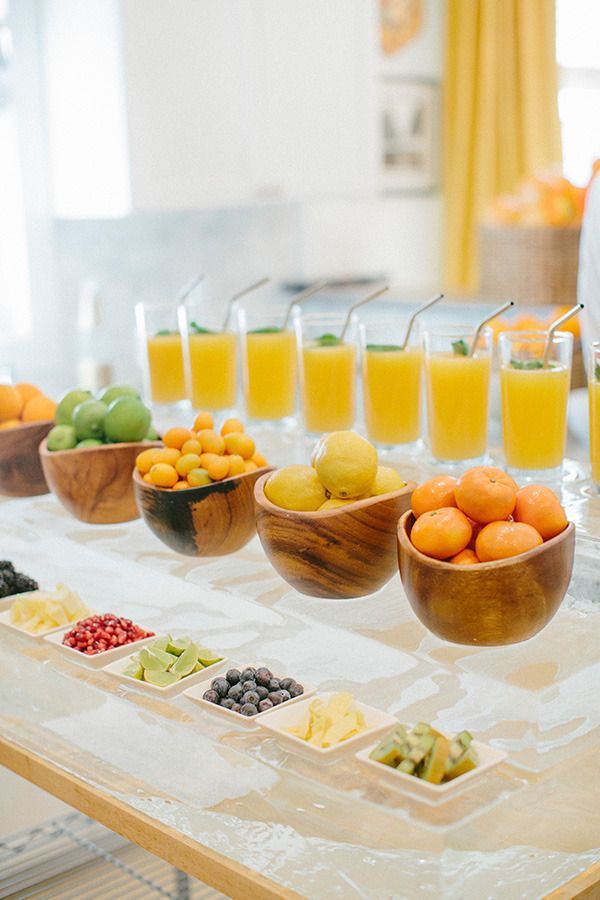
Product name
Product category
Brand
Barcode
Production information
0008
×
Tariff
You have selected subscription level Free .
The subscription price is now 0.00₽ .
Subscriber Registration Already have an account? Login here
Username
Password
Name
Surname
Full Name LEAVE IT BLANK
Processing...
Encyclopaedia Baby food
Nutrition education
In today's society, parents often discuss the correct habits of their children. How to behave at the table, how to eat, what foods will help you eat balanced, etc. The topic of good habits is discussed among parents, pediatricians and caregivers.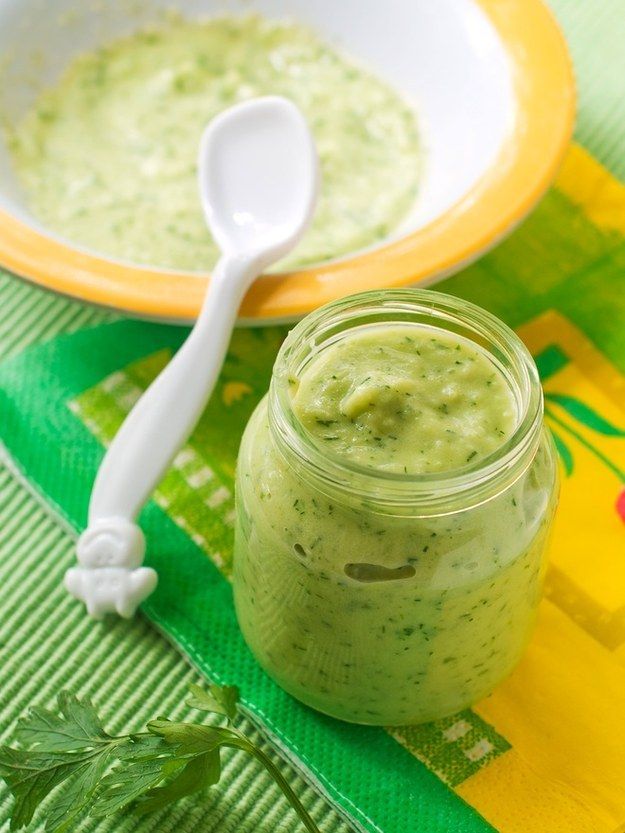 They are the key to a healthy unborn child.
They are the key to a healthy unborn child.
Picky Eater
A child's diet, especially at an early age, should be balanced and varied. Therefore, the strikes of the child against food from parents raise some questions. After all, many children are unpredictable in this matter and do not always eat everything they give, and sometimes they even flatly refuse to eat.
Herbs and spices
Gremolata is a bold and vibrant Italian seasoning that will spice up any dish. It's made with three simple ingredients you always have on hand: fresh parsley, lemon zest and garlic.
General Complementary foods
Overweight and obesity in children, adolescents and adults is a common pathology that is growing every year. For example, overweight is observed in almost every third child aged 12 to 16 years.
Picky eater
Have you noticed how often the same recommendations are given to mom.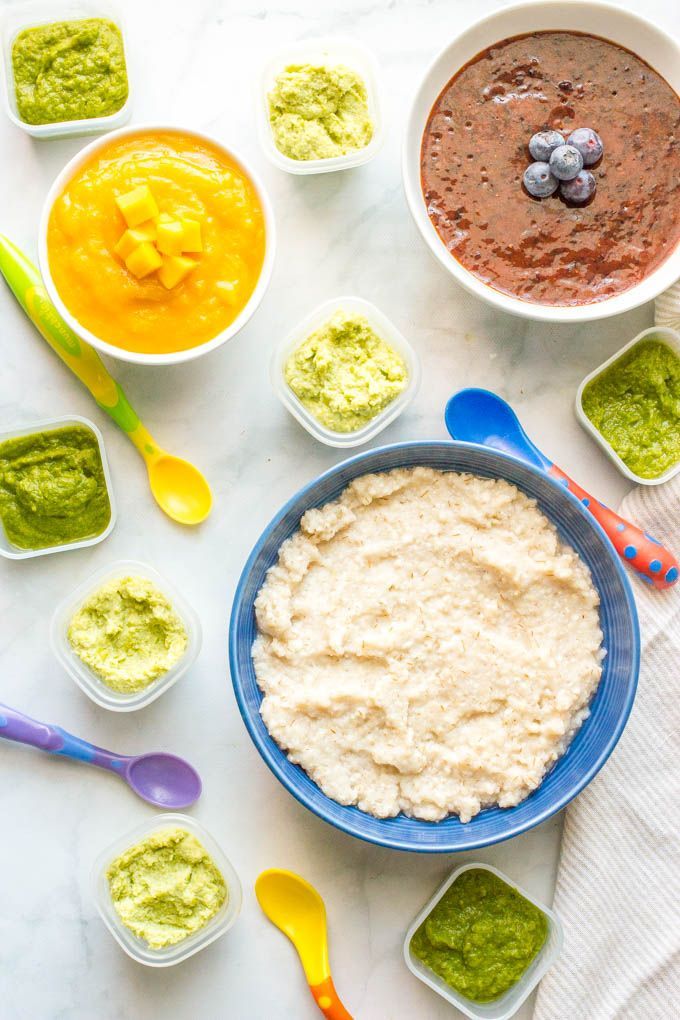 A tired mother is not very tired. Although the fastidious eater is tiring, it takes the last strength and patience. There comes a moment when it’s easier for mom to agree than to educate or resist the next “no”. I know it, passed!
A tired mother is not very tired. Although the fastidious eater is tiring, it takes the last strength and patience. There comes a moment when it’s easier for mom to agree than to educate or resist the next “no”. I know it, passed!
12-18 months Dairy-Free Meat-Free Sugar-Free Birthday Bake Dairy Flour New Year Lunch Vegetables Pie High Tea Cooked Recipes Fish Spices, Herbs, Seasoning Dinner Egg
No comments
My favorite fish pie was suggested to me at work 10 years ago. I would never have thought that it is easy to prepare, and it is so DELICIOUS. Moreover, a fish pie can be made super expensive or budget, it all depends on the desire and possibilities.
Picky Eater
In general, feeding a picky eater with protein is very problematic. Offering protein snacks is like death. What to do? Get behind the child or keep offering meat.
Nutrition education
It is important for parents that their children know how to cook.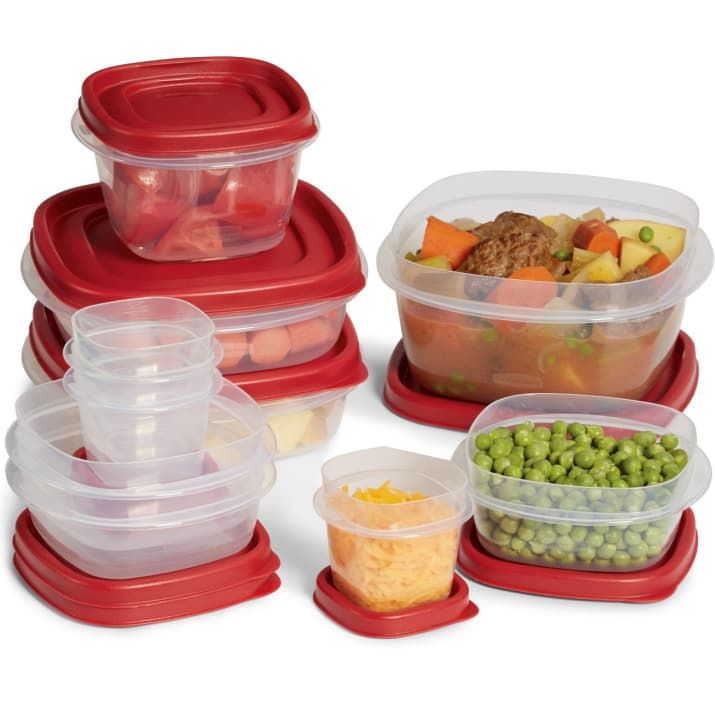 But it seems they will learn this themselves or the school will try in labor lessons. But the skill of cooking is acquired with the help of parents, when they teach them purposefully or by peeping during cooking. Today I present a series of articles Children in the kitchen.
But it seems they will learn this themselves or the school will try in labor lessons. But the skill of cooking is acquired with the help of parents, when they teach them purposefully or by peeping during cooking. Today I present a series of articles Children in the kitchen.
General
I wonder how nutrition affects the psyche and behavior? How do kids do in school? Or will they have learning difficulties, concentration or ADHD? Many people know that hungry people are more hostile, and some are even prone to aggression.
Nutrition education
Every day a parent raises a child. A lot of effort is put into creating the ideal image that is in the head of the parents. But by some miracle, the child still looks like mom and dad, and only the worst sides are noticeable, namely bad habits.
Fruit Complementary Food
Blackberry is a fruit that is high in vitamin C, fiber and antioxidants and is good for adults, but what about a child? Is it helpful? How to introduce complementary foods? Blackberries can children or not? I will try to answer these questions.